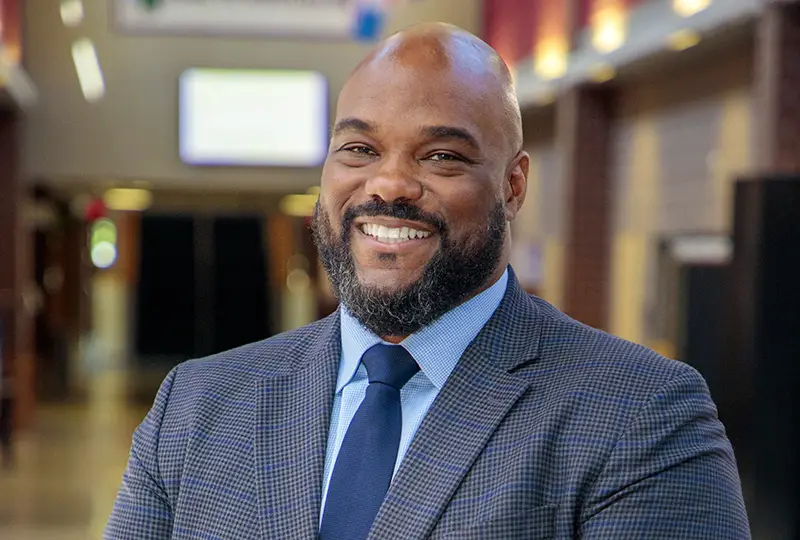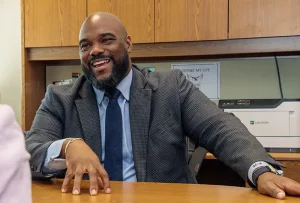Michael Brown, Winters Mill High School Principal
compiled by Kym Byrnes, photography by Nikola Tzenov
Balancing Acts: A High School Principal Shares the Challenges and Joys of Leading
Michael Brown is the president of the Maryland Association of Secondary School Principals (MASSP) and an advisory board member for the Maryland Center for School Safety. He has been featured nationally for his work in education, most recently in Education Week and on NBC’s “Today” show.
Brown says he is driven by a desire to improve education for educators and students. After more than two decades working in Baltimore City and Baltimore County public schools, Brown became the principal of Winters Mill High School in Westminster in 2018. He knew transitioning to Carroll County would come with personal and professional challenges, but he says that rather than deterring him, the prospect of those challenges only inspired him. Brown, who lives in Reisterstown with his wife and two daughters, says that success comes with building trust through relationships, being honest and respectful, and being a good communicator.
How did you find your way from a classroom teacher to a principal?
I majored in communications and played football at Shepherd University, and I just knew I wanted to work with youth. In the early 2000s, I started working in Baltimore City schools with students with emotional difficulties, and I loved it. I never really thought about being in leadership at that time, but there were principals who saw that potential in me. I started to get the principal itch around 2013, and eventually, I got the opportunity to come to Carroll County and jumped at it. It was a seamless transition and fit for me. That was six years ago.
Carroll County is different from Baltimore City in many ways. What made you want to come here?
I had always worked in urban settings, and as an African American male, you feel like you get typecast and are expected to deal with kids who are unruly and challenging. I didn’t feel like I was seen as someone who could work with students academically and support students through other challenges.
Even though I was doing that, it wasn’t recognized. What Carroll County gave me — and I’m thankful for it — is the opportunity to go to a school district where individuals don’t look like me. It meant I’d be able to reach a different demographic of students and community that I didn’t have the chance to work with in Baltimore City.
There were a lot of people who told me I should not come to Carroll County. I felt that I should, specifically because I knew it would be challenging; I wanted to challenge myself with something new. I’m glad I did, and I’m proud of the work I’ve been able to do here.
What do you love about your job?
The kids. I’ve been here long enough now that I’ve had kids from when they were 5 to when they aged out at 18, and seeing their growth is amazing. I can think of kids who were shy at first, but they kept coming to the program, and we watched them develop relationships with other 4-H’ers.
Now, they are the ones I can call upon to be leaders, and they are the first to step up. I love seeing that growth. I love seeing the older kids take opportunities for leadership trips. We also help youth interested in judging programs; we get them out there with the ultimate goal that they’ll make the state team and can travel to different places around the country. They know Carroll County, but we can give them opportunities and financially help them explore any opportunity the program has.
What challenges do you face as a high school principal?
I worry about where the profession of teaching is today. Even with the state’s Blueprint [the state’s education plan for the coming years], and teachers getting paid $60,000 to start — and kudos to Carroll County for being financially ready to support teachers and working with lawmakers to show that teachers matter — it’s still very difficult to find teachers to fill vacancies. I don’t know what the solutions are. We have to try to find a way to fix that in the state and county. We’re only as good as the teachers we have teaching our kids. [Carroll County] used to be where teachers taught far beyond their 30 years. There has been a shift where you don’t see teachers hanging on for 30 years. We have to figure out a way to positively impact the climate of teaching and learning.
There has also been a political dynamic more present since the pandemic that principals have to navigate. Being a principal means acting as a connector and understanding that, no matter what, people care about their kids. I always come from a place to meet them where they are: I care about your kids, too, so how can we meet in the middle to make sure we’re doing things in the best interest of your student?
There’s a lot of talk about how education has changed and how schools have been impacted in the wake of the COVID-19 pandemic. What’s the reality from your perspective?
I don’t know how much the students have changed. Post-COVID, it’s mostly the adults that have changed, and I think it’s for various reasons.
Parents my age and younger are way more immersed in their children’s lives now, especially at the high school level. Parents want to hand-hold right up until kids head to college. The result is that kids are not challenged with making decisions on their own and persevering through different challenges and circumstances. No one can argue that the pandemic was horrible and people lost a lot, and I know it made us hold our children a little closer. We’ve come out of the pandemic, but that hold hasn’t loosened for many parents.
What keeps you up at night?
The pitfalls of mental health and how that has dramatically shifted the game in education. Things that kept me up at night in Baltimore City were gun violence and drug activity. I’ve been to many students’ funerals. But when I came to Carroll County, kids didn’t have that stuff.
The first year I was here, I lost a kid to suicide, and I was like, ‘What is this?’ I was used to kids trying not to get killed; I wasn’t used to kids inflicting harm on themselves. It was mind-blowing for me, and that was before the pandemic. When coupled with the pandemic, it’s a true challenge for our school counselors, teachers and support staff to support students every single day who are having suicide ideations, depression and anxiety.
It’s horrifying that, any day, you could lose a kid because of these things. It’s something kids are fighting actively every day. That keeps me up at night — not knowing when, who and why, and wondering if I have done enough to build connections and provide resources. It’s something I’ll never get comfortable with.
There are plenty of challenges to being a leader in education. What are some of the joys?
The kids make me want to come here every day. I’m motivated by the environment, by seeing kids navigate on their own, face challenges and grow.
I get to help them along the way and have real conversations about relationships and stuff happening at home or difficulties they’re having in class, helping them figure out life and juggle the immense demands teens face today.
I take great pride in those relationships, and I tell the students it’s for life, and I mean that. I keep an active social media presence, and it’s not just for my current students; it’s also to stay connected with former students. If they continue to see me as a positive voice and influence, then that’s good.
Nothing can beat a positive relationship with a student. You can suspend them. You can give detention. You can do all these things, but real change comes with a positive relationship. Keep the kid coming to school and engaged with the high school process; that’s when you get to change their trajectory.
Would the 21-year-old version of you be surprised by where you are today?
I think an earlier version of me would be somewhat surprised by the national stage I’ve been on at times. But my main goal has always been to uplift education. After my first year in the classroom in Baltimore City, where we had students who couldn’t read, it drove home for me that we are a better country than the results of some of our educational efforts.
The only thing that stops us from being better is ourselves. My goal is to help students get to the highest level they can and achieve their goals and dreams. For me, that means doing it at whatever level is necessary — advocating on behalf of principals as president of the Maryland Association of Secondary School Principals, working with national educational organizations, presenting at conferences and talking to colleagues around the country.
I don’t think there’s anything better than to talk to educators in other places and know there are common challenges that we all face when it comes to education. If I’m given a platform, I will continue to do that.
It’s not about me; it’s about the kids and educators and hard-working people in this profession.



